Rakha: The number of Amazigh-language newspapers does not exceed one in the Maghreb region
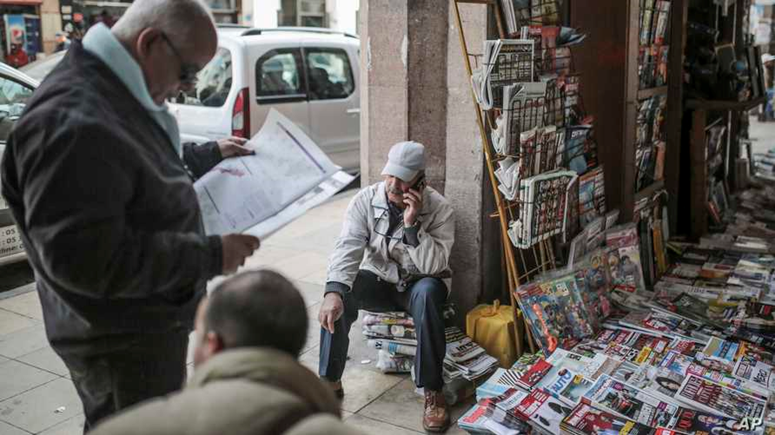
A kiosk selling newspapers in the Moroccan city of Rabat - archive
Moroccan journalists celebrated, on Wednesday, the National Day of Information and Communication, an occasion to shed light on the reality of the Amazigh written press, 12 years after the constitutionalization of this language as the country’s second official language.
In this interview with “Maghrebi Voices”, Rachid Rakha, the Amazigh activist and publisher of the newspaper “Al-Alam Amazigh”, which he describes as “the only one” in the Maghreb region, talks about the experience of this newspaper, which combines materials written in Arabic with others in the Tifinagh script, and the most prominent challenges facing the media. Amazigh written in Morocco.
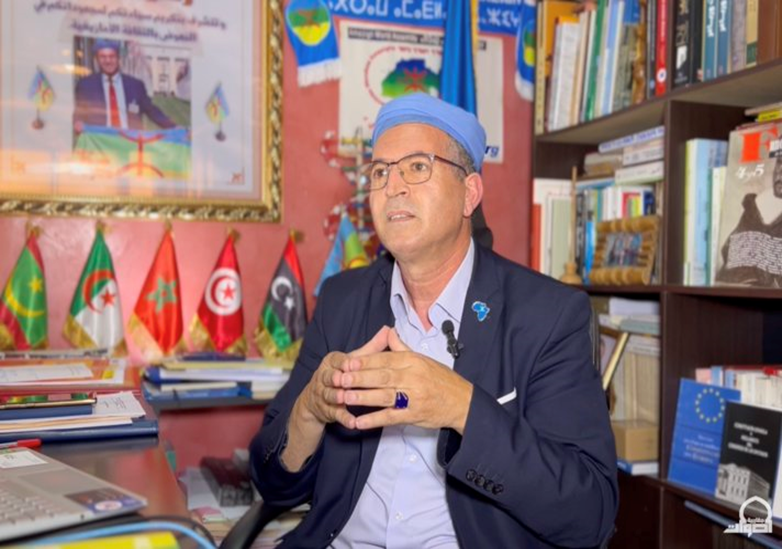
President of the International Amazigh Community, Moroccan Rachid Rakha
Interview text:
“The Amazigh World” newspaper was founded in 2001 and today it is considered one of the most prominent Amazigh newspapers in Morocco. How do you evaluate this experience?
In fact, thinking about undertaking this experience was an adventure, given the magnitude of the challenges that the Amazigh language was experiencing at that time and the exclusion of the Amazigh language and culture in the Arabic or French-speaking media. However, we underwent this experience with a bank loan whose value did not exceed 200 thousand dirhams (about 20 thousand dollars). We launched the newspaper as the first Amazigh media company in Morocco.
After a year of experimentation, we incurred huge losses, as the cost of production was more than double the profits, and we would not have continued had we not obtained stable advertising from one of the banking institutions that has accompanied the newspaper since its founding until today.
During those years, the newspaper succeeded in covering many topics that were until recently taboo, such as the issue of poisonous gases in the Rif region, the issue of the assassination of leader Abbas Al-Masidi, and issues of democracy and human rights. We succeeded in being a voice for the Amazighs who had suffered marginalization since the country’s independence.
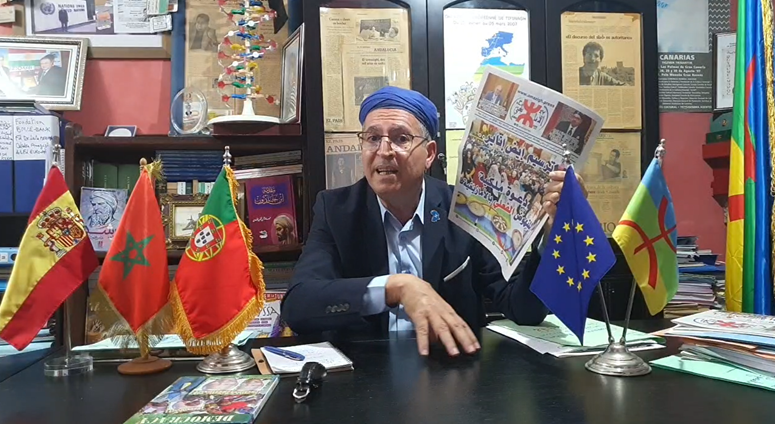
Today, the newspaper distributes 10,000 copies per month, and we have an electronic news website in three languages: Amazigh, Arabic, and French. We aspire in the future, if resources become available, to launch other versions in Spanish and English.
Unfortunately, the dynamism that the newspaper opened was not matched by other Amazigh media experiences, nor were Arabic-speaking newspapers and media institutions keeping pace with it, despite the openness that the country experienced.
The number of journalists working in the “Amazigh World” often does not exceed three. Why limit the number of journalists to this small number?
We frankly aspire to increase the number of journalists working in the newspaper to 15 or twenty journalists, but with weak resources and a lack of public and private support, it is difficult to achieve this ambition at the present time.
To clarify the picture, with the exception of advertisements from a public operator in communications and a banking institution, the newspaper does not have any stable support. Even the public support provided to the newspaper has recently decreased to 160 thousand dirhams annually (about 16 thousand dollars), which is barely enough for us to cover the wages of journalists, while the institute’s support does not exceed Royal Commission for Amazigh Culture: $4,000 annually.
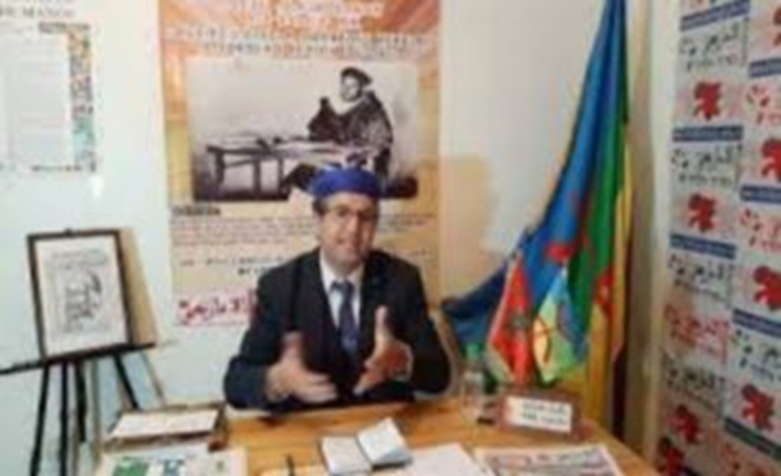
In the same context, I filed a complaint with the Minister of Youth, Culture and Communication, Mehdi Ben Said, last year, in which I denounced the suspension of annual support, which I described as “very meager,” for the Amazigh press. Did you receive any clarification or response from the ministry?
Unfortunately, I did not receive any response, and I also do not understand the discrimination and marginalization practiced by some institutions against the Amazigh language and against us as its newspaper.
How do you see this, since 12 years have passed since the constitutionalization of the Amazigh language, and in light of the Royal Institute of Amazigh Culture accumulating more than 22 years of experience in the field of developing and preserving the Amazigh language and culture, and the authorities’ emphasis on the importance of promoting the Amazigh language in the media and in other aspects of public life?
Unfortunately, they are just slogans and do not exist on the ground, and the injustice against the Amazigh has not yet been lifted despite the presence of a royal will that called more than once to break with previous public policies.
One of the surprising things is that most of the businessmen and capital owners in Morocco are Amazigh, and most of them lead giant companies in Casablanca, but they do not pay any attention to the Amazigh language and have never thought about supporting these journalistic experiments that struggle every day to continue publishing, and at the same time they lavish their advertisements on Arabic-speaking newspapers. And French.

Before the royal recognition of the Amazigh language and culture in 2001 and its constitutionalization in 2011, we believed that the reason might be due to their fear of the authorities, but today, after the transformations that the Amazigh language has known and the gains it has achieved in recent years, we do not frankly understand the reason that drives these people to demean and marginalize the Amazigh language.
I think perhaps the reason is due to the continued influence of Arab nationalism on the minds of many Moroccan officials. Unfortunately, they have not been able to get out of this whirlpool that makes them sanctify the East, despise their civilization whose history extends for centuries, and forget that the Amazighs were the ones who brought Islam to Europe and to the countries south of the Sahara.
The writer Tijani Boulaouali says in his book “The Amazigh Written Press in Morocco between Origins and Development” that “at a time when the Moroccan press written in Arabic is experiencing a tremendous revolution in production and distribution, the Amazigh press is moving very slowly.” How do you explain this paradox?
I agree with him, and I see, as I said, that the reason is due to the continued marginalization and exclusion of the Amazigh language, such that about a month ago, the newspaper publishers’ associations held a meeting in Casablanca, and when I arrived to attend it, I was prevented from entering and the door was closed in my face.
Here I wonder: What is the reason that prompts these people to exclude an Amazigh newspaper from their meetings, and what is the reason that makes them continue to exclude the Amazigh language in their meetings and in their newspapers to this day, despite the gains that our country has achieved since His Majesty the King ascended to the throne in 1999?
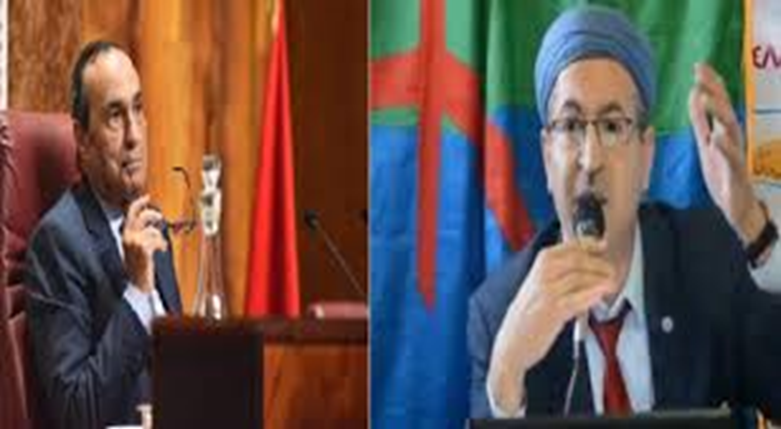
I believe that this mentality that I referred to is what drives many officials to marginalize and exclude the Amazigh language and discriminate against its speakers, and thus there is no political will to advance the Amazigh language, whether in the media or in other areas.
As an example of this, Morocco launched workshops on teaching the Amazigh language in primary public schools in 2003, and today, 20 years later, the rate of circulation of the Amazigh language in those schools does not exceed 10 percent, and the Ministry of Education continues to ignore the directives of the World Bank that recommend the importance of teaching the mother tongue. The same reasons are responsible for this vast difference between Arabic-language newspapers and their Amazigh counterparts.
As a leader in the Amazigh World Assembly, how do you evaluate the experiences of the rest of the Maghreb countries in Amazigh written media, and are there any leading models in this field?
Unfortunately, “The Amazigh World” newspaper is not the only newspaper in Morocco, but it is also the only Amazigh-speaking newspaper in the Maghreb region, and therefore we feel the burden of responsibility and are struggling to survive.
Previously, there were experiments in the Kabylie region in Algeria, but they stopped due to the repression of the authorities, and our brothers in Libya did not succeed, despite the dynamism experienced by the Amazigh language in the country after 2011, until today, in launching Amazigh-language newspapers.

Great importance must be given to the Amazigh press in the Maghreb region, and Amazigh businessmen must encourage and provide support for these experiences because they contribute to self-awareness and the embodiment of a state of democracy and human rights.
Source : websites

